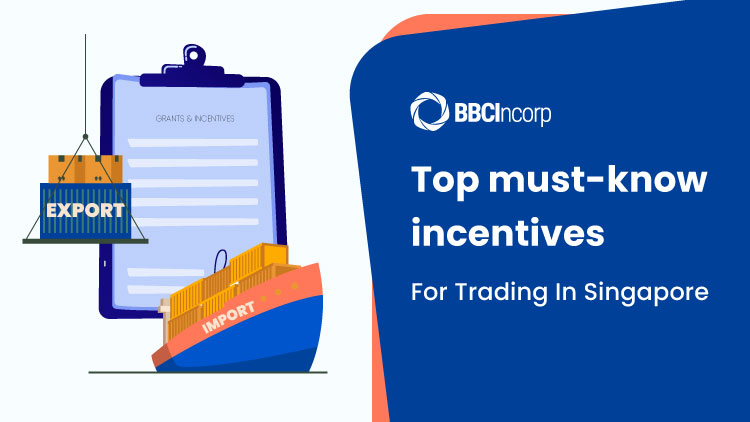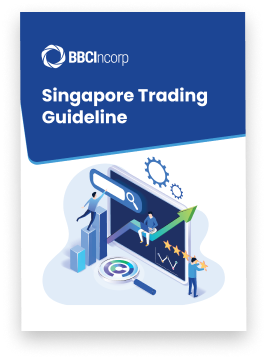
If you are looking to set up a trading business in Singapore, you will be pleased to know that the government offers a range of incentives and grants to help businesses get started.
This is great news for businesses, as it makes it easier to get started and helps reduce the costs associated with starting up. In this blog post, we will discuss some of the key incentives offered by the government for trading businesses in Singapore.
Singapore as a trading hub
Strategic location
Singapore’s status as a financial powerhouse in Asia is made possible foremost because of its strategic location, being the juncture point at the crossroads of the East-West trade.
This catalytic advantage is the reason why its transportation hubs are always packed with hubs and air cargo; Singapore container ports are always busy with an unstaunched flow of trading activities.
Other strong financial meccas like Hong Kong and China are also in a long-term reciprocal relationship with Singapore.
Startup founder scheme in Singapore
Additionally, the Singapore legal system provides certainty and stability for businesses operating in the country. These factors make Singapore an attractive destination for trading businesses looking to set up operations in Asia.
The Enterprise Development Grant (EDG) is a government grant that provides financial assistance to companies in order to help them grow and scale their business. The EDG can be used for a variety of purposes, such as funding marketing initiatives or expanding into new markets. Trading businesses in Singapore can benefit from the EDG by using it to support their growth plans.
The Market Readiness Assistance (MRA) grant is another government grant that can be used to help SME businesses enter new overseas markets or develop new products and services. The MRA can be used for a variety of purposes, such as funding market research or developing go-to-market strategies. Trading businesses in Singapore can benefit from the MRA by using it to support their expansion plans.
Try our Singapore grants & incentives tools a find out what programs can support your growth plans.
Tax exemption on foreign-sourced income
You’ll be glad to know that there are exemptions in place for specified foreign-sourced income remitted into Singapore, allowing you to retain more of your profits. Singapore’s foreign-income tax exemptions apply to both corporate and individual taxpayers.
To qualify for such lucrative tax reliefs, you have to first meet 3 statutory requirements as laid out under Section 13(9) of the Income Tax Act 1947:
- Your foreign income has been subject to another tax regime from which it is received. Note that the rate can therefore deviate from the headline tax rate;
- A minimum threshold of 15% Corporate Income Tax rate is imposed on the foreign income at the time of it being received in Singapore; and
- The tax exemption is deemed by the Comptroller of Income Tax to be beneficial to the Singapore tax resident company
If you meet these conditions, you can enjoy tax exemption on your foreign-sourced income. This incentive is extremely beneficial for trading businesses as it provides them with more opportunities to grow their profits.
Industry-specific tax incentives
The Singapore government offers a variety of tax incentives for businesses across different industries. For trading businesses, the main incentive is the Productivity and Innovation Credit (PIC) scheme, which provides a tax deduction of up to 400% on qualifying expenditures on qualifying activities that improve productivity and innovation.
There are also various general tax incentives available, such as the Corporate Income Tax (CIT) rebate (applicable for the 2013-2020 YAs* time period), which provides a tax rebate of up to 20% of qualifying corporate income; and the Foreign Direct Investment Scheme (FDIS), which provides a range of tax incentives for foreign companies investing in Singapore.
*The Year of Assessment (YA) 2018 marks the expiration date for the PIC scheme. Businesses with expenditures incurred after the basis period of YA 2018.
Singapore double tax deduction scheme for internationalization
The Singapore Double Tax Deduction Scheme for Internationalization (DTI) provides businesses with a 200% tax deduction on qualifying expenses incurred when expanding their businesses overseas.
This is an initiative by the Singapore government to encourage businesses to expand their operations overseas and help them to overcome some of the initial costs associated with doing so. The scheme can help businesses to reduce their overall tax bill and make it more viable for them to expand into new markets.
If you are thinking of expanding your business internationally, then the DTI scheme is definitely something to consider. It could help you to reduce your overall tax liabilities and make the expansion process easier and more affordable.
Singapore Free Trade Agreements (FTAs)
Free trade agreements (FTAs) are critical in ensuring the smooth flow of trade between two countries. By lowering or removing tariffs and other trade barriers, bilateral agreements make it easier for businesses to trade with each other.
Singapore has an extensive list of bilateral and regional trade agreements that enable the free flow of trade between it and the respective trading partner(s). This increased trade conductivity is especially important for businesses that rely heavily on imports and exports.
Some of the most important bilateral agreements for Singaporean businesses include the China-Singapore Free Trade Agreement (CSFTA), European Union-Singapore Free Trade Agreement (EUSFTA), and India-Singapore Comprehensive Economic Cooperation (CECA), and Japan-Singapore Economic Partnership Agreement (JSEPA).
By familiarizing yourself with the various bilateral FTAs that Singapore has in place, you can ensure that your business is taking advantage of all the opportunities for free trade. This will help you to maximize your competitiveness and minimize your costs when setting up a trading business in the country
Singapore DTAs
Double taxation agreements (DTAs) are treaties between two countries that aim to avoid double taxation of income earned in one country by residents of the other country.
DTAs can also provide for reduced rates of withholding tax on certain types of income, such as dividends, interest, and royalties.
In Singapore, there are currently more than 90 DTAs in force. These DTAs cover a wide range of countries, including major trading partners such as the United States, China, and India.

New guide
Unlock insights of Singapore's trading business!
Everything you need to know about starting an overseas trade business in Singapore.

Conclusion
Incentives are a great way to encourage trading businesses to set up or expand their operations in Singapore. The various tax incentives, subsidies, and other support schemes offered by government agencies and other organizations can help businesses save on costs, access new markets, and tap into new technologies.
However, it is important to do your research and understand the eligibility criteria and conditions attached to each incentive before making any decisions. We hope this article has given you a better understanding of the different types of incentives available for trading businesses in Singapore. If you have any questions or need assistance with your application, feel free to contact our team via service@bbcincorp.com.
Disclaimer: While BBCIncorp strives to make the information on this website as timely and accurate as possible, the information itself is for reference purposes only. You should not substitute the information provided in this article for competent legal advice. Feel free to contact BBCIncorp’s customer services for advice on your specific cases.
Industry News & Insights
Get helpful tips and info from our newsletter!
Stay in the know and be empowered with our strategic how-tos, resources, and guidelines.


